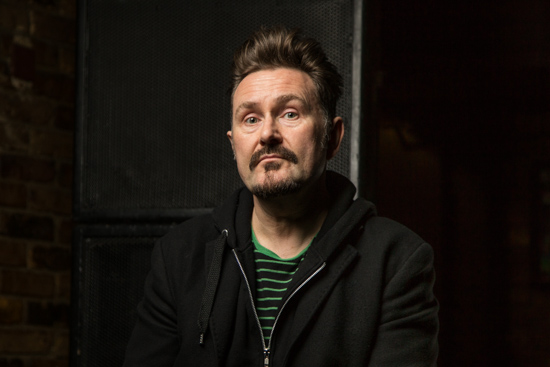Andy Cairns portrait by Jose Berjaga
Andy Cairns is the product of so many musical histories that it’s strange to think he’s never been to the Hope and Anchor where so many of them began. The Islington pub became a bolthole for the bands who eventually defined punk – Joe Strummer was a regular; Stiff Records started in the upstairs room, the Sex Pistols piled in after calling Bill Grundy a rotter on telly. Joy Division played their first London show in the basement at 60p a ticket in 1978. "This is where it happened," says Cairns, investigating the subterranean doorways and accidentally setting off the alarms. "Ian Curtis, god bless him, had an epileptic fit on the way home after that show." The obvious talking point might be Therapy’s cover of ‘Isolation’ from Troublegum, but there are other classic records to discuss in the meantime. "I’ve got a copy of this one," says Cairns, looking up at the framed twelve-inch of ‘This Perfect Day’ by the Saints, recorded at the Hope in 1977. "The Saints also had a great song called ‘I’m Stranded’ – one of Nick Cave’s all-time favourites." The talk is more historic than nostalgic yet the sense in these circumstances, however serendipitous, is one of inevitability. When we stepped in from the street the jukebox – some 27,000 songs – was playing the last seconds of Therapy’s own ‘Teethgrinder’.
"One of the biggest misconceptions with Therapy? is that I’m a huge heavy metal fan," says Cairns. "I’m not. Punk has informed my entire life. I must state that now. To this day I love all kinds of music but when I was 13 and 14 I discovered the Buzzcocks and the Ramones. They’re the reason I’m sitting here now. Growing up on a grey estate in Ballyclare, people like Bowie or Electric Light Orchestra or Led Zeppelin – these people that looked really stunning and were complete maestros on their instruments – they were a million miles away. But the Buzzcocks and the Ramones, or people like Rudi and the Undertones were a gateway. If it wasn’t for them I would never have picked up a guitar."
Punk felt naughty on the Erskine Estate in Ballyclare, the country Antrim town of about 7,000 where Cairns grew up. Surprisingly the town sustained a couple of different styles and subcultures in the mid-seventies as people discovered music and distinguished themselves from religious identities or irreligious neutrality.
"There were groups of rockers," says Cairns. "There were teddy boys because of bands like Matchbox or the Polecats – there’d be people on Ballyclare main street with pink drape-coats. There were skinheads. There were also Mods – it’s funny to think of it. But there was one punk. He was called Leechy. He looked like Sid Vicious. He had all the gear on, which could have been quite dangerous in the area. If you were a stranger to the town the chances were you’d have got a kicking. But that was the thing: Leechy knew everybody so they just thought he was an eccentric. There was also a guy called Constable Cornflakes. He wasn’t a policeman but he went from shop to shop speaking into a pretend walkie-talkie."
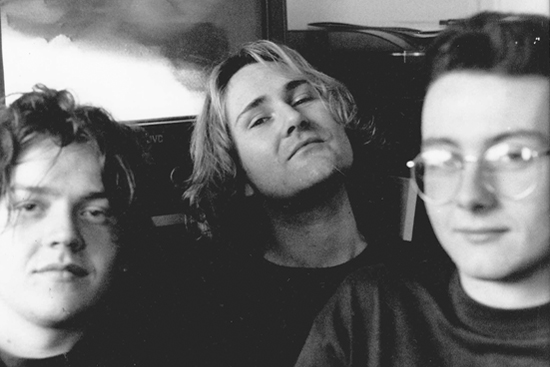
Fyfe Ewing, Andy Cairns and Michael McKeegan in Belfast, 1989. Photo: Elaine McDonald
Therapy? formed in 1989, recording the 30 Seconds Of Silence demo tape in an attic with an 8-track and an engineer named Colum Muinzer, a Canadian living in Northern Ireland who had released singles with the glam-rock band Cruella De Ville on Belfast’s Good Vibrations label before signing to EMI in 1983. After the independent single ‘Meat Abstract’, Cairns, along with bassist Michael McKeegan and drummer Fyfe Ewing, negotiated a deal with Gary Walker of Wiija Records and recorded the mini-album Babyteeth with engineer Mudd Wallace in his Randalstown studio. They took two days for six tracks, allowing Cairns to work a night shift at the Michelin tyre factory in Ballymena.
"Mudd’s place was a proper recording studio," says Cairns. "There were a couple of bunk beds which meant we could stay over. But for the first time ever we were making lots of mistakes. We were all a bit uptight. Mudd asked if we normally had a drink before we went onstage. We said, yeah, we’d maybe have a couple of beers. So he walked down Randalstown high street and came back with a crate of beer and a bottle of tequila. He clapped his hands and said ‘Right: now we’ve got an album.’"
Nowadays Cairns wouldn’t advocate alcohol as a creative aid, but nor can he discount the benefits. He is no stranger to darkness – along with Babyteeth his favourite Therapy? records include the stark and brooding Crooked Timber and Suicide Pact – You First, though certain songs on new album Disquiet are joyous by comparison. With fourteen studio albums Therapy? have just set a record for an Irish act, and the buzz is positive. ‘Tides’ is an anthem of self-realisation that could bring a young act to radio glory, but it finds its emotional opposite in ‘Deathstimate’, a beautifully heavy Sabbath-style track picking up on Christopher Hitchens’ melancholy reflection that each day, as the years roll on, can begin to seem like more and more subtracted from less and less. There’s ‘A Vulgar Display Of Powder’ which Cairns describes as a ‘dressing-down’ in light of some of the excesses he’s been party to. In the Hope and Anchor Cairns drinks peppermint tea as they’ve run out of green. In recent years alcohol means an occasional beer before showtime or, on tour, a drink after dark and a book by Samuel Beckett in the bunk.
"Recording Babyteeth and getting drunk on tequila and beer was almost a novelty," he says. "Like Boy’s Own stuff – having a naughty wee adventure with a bit of drink. And you would get inspired because you wouldn’t be as self-conscious. You would try a noise part on the guitar that you mightn’t pull off if you were criticizing yourself at the back of your mind. But it gets to the point where it clouds your judgment and you don’t write proper songs anymore – that’s the time that I realized it was getting too much."
Neither of us have to say the word alcoholism to understand that the financial success of Troublegum in 1994 and the creative success of Infernal Love in 1995 brought a pressure that continued until the release of Semi-Detatched, which would turn out to be the Therapy?’s last album on a major label when A&M records ceased to exist in 1998. Drummer Ewing decided to leave the band in 1995, which resulted in the group actually growing to include drummer Graham Hopkins and cello-playing guitarist Martin McCarrick, previously of Siouxie and the Banshees. "Drinking in bad times is never a good idea," says Cairns, willing to discuss the difficulties and themes he normally channels into songs. Since the arrival of drummer Neil Cooper the band has struck upon a new seam of stability and creativity, though I wondered if Cairns had ever had real concerns over his own health and wellbeing.
"Yeah," he says. "Many times. To be honest I was headed in a really bad direction until I got married. I think I really was. I had absolutely no self-regard, physically, through the amount of alcohol I drunk for maybe three or four years. Part of the 90s, then there was a relapse in the late 90s. I’d put on quite a lot of weight as well, at the time we were trying for a family. I had a look at myself and said ‘this is not what I want to be.’
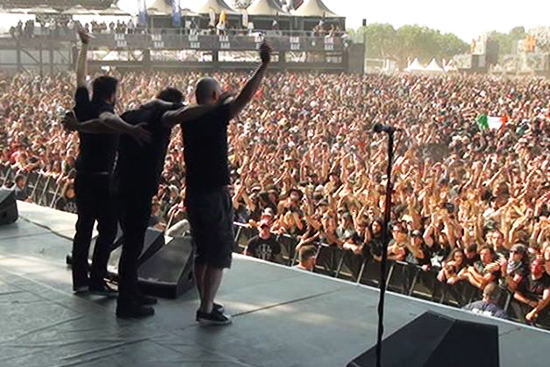
Neil Cooper, Andy Cairns and Michael McKeegan at Hellfest, France, 2014
"There were a few times there’s been interventions," he says. "I’ve been sent to the health farm twice. The first time I stayed for a few days then just got a train back to London. The second time I stayed for a week and had horrible withdrawal symptoms. The worst feeling was trying to get up in the middle of the night and not being able to move – being completely paralysed although yet awake. Then there were various shapes – grey shapes moving around at the foot of my bed, almost holding me down.
"It got really really bad, but also I was brought up to not – our family was very working class – it wasn’t an emotional family. There were no great displays of emotion in our family. If you got yourself into any kind of trouble you didn’t go running to someone. With the drink, I was very very aware of what I was getting myself into. It got to the point where I’d been drinking every day for at least two years and I came back from tour and experienced the worst DTs I’ve ever had. Couldn’t leave the bed. Couldn’t move. It was horrendous. I thought, there’s got to be a way to stop this."
In the 26-year history of Therapy? there have only ever been a handful of cancelled shows and it’s important to note that while drinking was rife for a time no cancellation has ever had to do with excess. "It got to the point where drinking was part and parcel of it," says Cairns. "We all know what Irish booze culture is like. But as long as the gigs were being done, as long as nobody fucked up magnificently, we were fine. Michael McKeegan would always be the first to have a word. Michael would be the first to say, ‘You need to calm yourself down.’
"My brother, also, is a nurse. He’s got that deadpan Northern Irish sense of humour. In one candid moment I said to him that I think I might have a drink problem. And he said, ‘Well, yes, you drink every single night. But look: I work with homeless people and alcoholics. If you don’t drink for a couple of weeks you’ll be fine. If they didn’t drink for three or four hours they’ll die. So don’t be making a fool of yourself saying, ‘Poor wee rock star me.’
"In the end it does just come down to you taking responsibility. Like everything else, only self-realisation worked. I caught myself on even though it took quite a few efforts. And I don’t know – I think I got more out of it that way."
At this point alarm bells are ringing. Literally. Or apparently. The chatter and atmosphere in the Hope and Anchor is gradually hushed under the squeal of a long siren. The lunchtime crowd look outside expecting to see police cars zooming along Upper Street. Cairns is undisturbed. He cackles and eyes the jukebox. "That’s Gary Moore," he says. "It’s ‘Parisienne Walkway’ – one of the longest sustained guitar notes ever recorded. When Therapy? recorded High Anxiety we worked with a guy called Dan Turner who had worked with both Cradle of Filth and Gary Moore, before he died. He said out of the two, Gary Moore was just skull-crushingly loud. It’s a sign: our interview interrupted by a Northern Irish guitarist from beyond the grave."
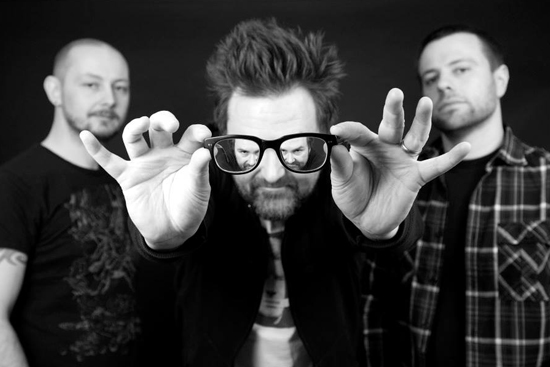
Michael McKeegan, Andy Cairns and Neil Cooper. Photo: Carrie Davenport
Ask Andy Cairns about sheer volume and he’ll tell you that The Manic Street Preachers are actually louder than Sepultura. He has played onstage with both. He became friends with James Dean Bradfield in 1992, keeping in touch over Christmas and getting together whenever possible. Cairns first heard The Holy Bible on a pre-release CD that Bradfield shared during a drive to Dublin airport, saying, ‘You might actually like this.’ Last year Bradfield invited Cairns to play ‘You Love Us’ on the final night of the Manics’ Holy Bible residency at the Camden Roundhouse, lending him a black Les Paul and introducing him as one of the only friends he’d ever had from another band.
"James has always been there for me," says Cairns. "He’s been great. I remember years ago, Gibson guitars, who used to sponsor me, brought out this book of ‘Gibson players’, and they hadn’t mentioned me in it. James was furious."
Bradfield has spoken up for Cairns over the years, feeling that he has been overlooked in the revisionism that routinely takes place in the music press. "James gives me a lot of confidence, because he’s an amazing guitar player, and moreover an amazing musician. He’s one of the people that I actually know who inspires me. The thing with Sepultura was in Werchter in Belgium in 1994. Max Cavalera was a Therapy? fan and said after our slot: ‘Hey, you like Discharge, don’t you?’ Do you know ‘Hear Nothing, See Nothing, Say Nothing’? Go to the side of the stage four songs in.’ The tour manager decked me out in a Brazil shirt, handed me a guitar and shoved me out in front of 50,000 people. But it was quite quiet, onstage. I don’t mean that disrespectfully – it was quiet because, like the Manics, they’re such good players. But the Manics are very, very loud. At the Roundhouse I thought, well, the Manics, they’ve been going for as long as Therapy?. It might actually have become quite polite onstage. Boy was I wrong."
The Manics had opened for Therapy? during their French tour in 1992, and the next couple of years saw Therapy? heading to the USA on tours with Helmet, The Jesus Lizard and Henry Rollins. In the UK they completed a fondly-remembered Melody Maker tour with Silverfish and Gallon Drunk. "Gallon Drunk: such an influential band," says Cairns. "Our riff for ‘Potato Junkie’ actually comes from me trying to write a Gallon Drunk-style bassline. Of course by the time Fyfe, Michael and myself got together it was played at breakneck speed.
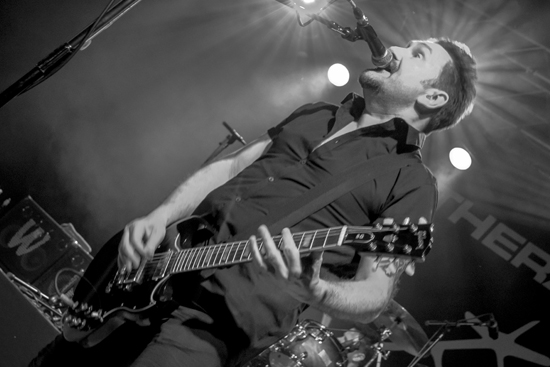
Andy Cairns onstage in Wolverhampton, 2014. Photo: Tim Finch
"And another thing that people don’t know," he says, with the air of a man finally able to break omertà: "Those frilly shirts we wore on Infernal Love? The ones we got so much flak for? That was all Gallon Drunk. Anton Corbijn suggested we wear them for the photos. Nine times out of ten we would have said, ‘We are not wearing those ridiculous clothes.’ Especially following up Troublegum. But we thought, well, Gallon Drunk wear stylish gear like this, and it looks good on them…"
Therapy? and Gallon Drunk were reunited in a chance meeting at the Variety Bar in Glasgow when both bands happened to be playing at different venues on the same night in 2012. Cairns’ delight is evident when talking about old friends but despite all the chat about old times the focus is very definitely on the present. 2014 was meant to be a quiet year, but the twentieth anniversary re-releases of both Troublegum and Infernal Love meant a sold-out Troublegum tour which led straight into recording Disquiet in Newcastle Upon Tyne. In addition to a selection of European festival dates Cairns also set off on an acoustic tour which finished in Vienna just before Christmas on December 20. "It ended up being a really lovely night," says Cairns. "To be in Vienna on 20 December on a Saturday night was wonderful. They take Christmas very seriously. But for me it’s the history: people like Schubert, or the architecture and the way the city’s set out like a cake." Therapy? have always gone down well there too, he says, thinking ahead to the Disquiet date booked for later in the year. And that seems to be the thing about Andy Cairns – although he’s spent the afternoon talking about many different histories he seems to be a man of many different futures, too.
Disquiet by Therapy? is out now on Amazing Record Co. The band are currently on tour

